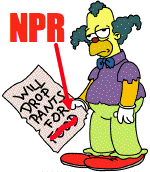
 Question for the NYT
Question for the NYT 
 I understand that links from Twitter and Facebook will pass through the paywall. As readers of this site know, I am preparing tools that route-around these Corporate Blogging Silos. I simply publish my links through RSS and depend on TwitterFeed to push them to Twitter. And the links should flow everywhere else, because RSS is so widely understood.
I understand that links from Twitter and Facebook will pass through the paywall. As readers of this site know, I am preparing tools that route-around these Corporate Blogging Silos. I simply publish my links through RSS and depend on TwitterFeed to push them to Twitter. And the links should flow everywhere else, because RSS is so widely understood.
I hope to encourage many more people to do the same, and I think they will want to, as Twitter becomes more restrictive. I think this is in everyone's interest, except perhaps the owners of the CBS's. I believe independent publishers like the Times will eventually come to appreciate that there are options that don't flow through bottlenecks created by the tech industry.
So here's the question. Is the Times going to encourage people to stay inside the silos by only offering special access to them, and not to people use systems that are not siloed?
Update: Mark Cooper says "all links will pass through the paywall."
 We should invest in public broadcasting
We should invest in public broadcasting 
 I have a fairly unique position to view this, as one of a small number of people who pushed podcasting forward 10 years ago (the anniversary was in December).
I have a fairly unique position to view this, as one of a small number of people who pushed podcasting forward 10 years ago (the anniversary was in December).
It's a long story, but NPR's support, starting with Tony Kahn and WGBH, was crucial. I don't think it would have reached liftoff it weren't for their involvement.
And they were able to participate because they are non-commercial. Commercial radio couldn't have played the same role.
We need to have more media that isn't corporate. We also need more programmers who aren't but that's another story.
Anyway, when the next technology like podcasting comes along, we're going to want to have a media organization that can afford to experiment.
Maybe the tech industry can pool its resources and come up with the money the US government isn't allocating. It would, imho, be a good investment. Really not very much money when you consider how much is being poured into random startups, and what can be built off this kind of experimentation.



